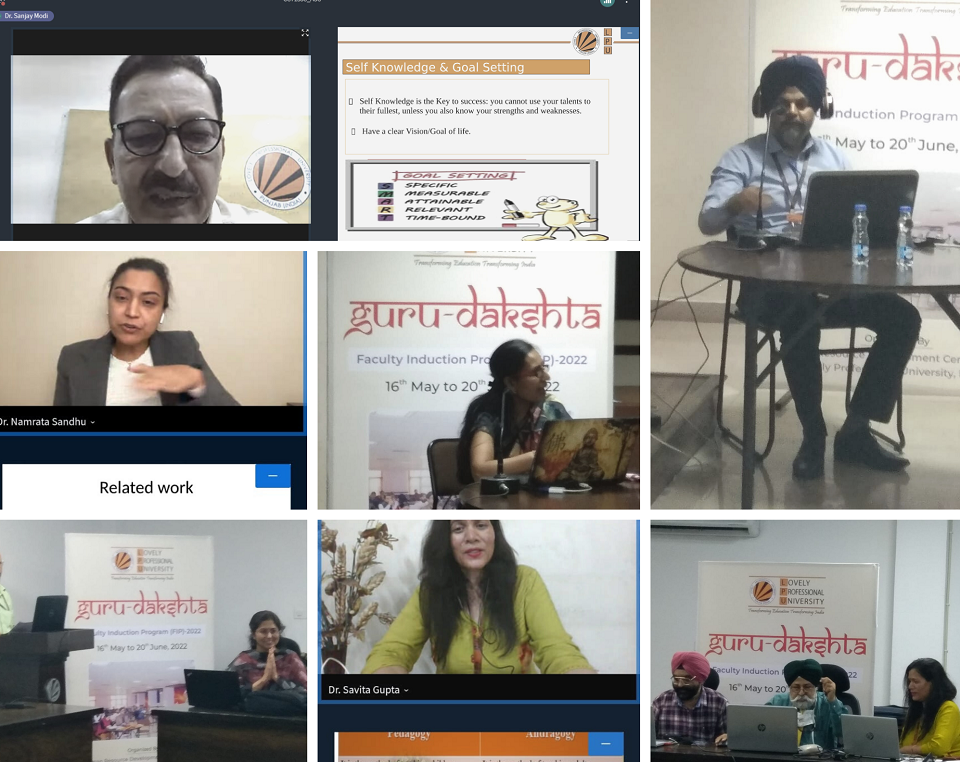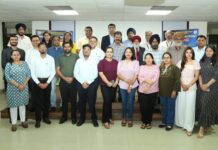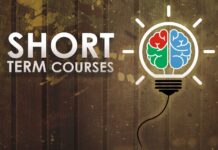Teachers are the pillar of strength and the guiding force in a student’s life. Teachers pass on values to students, prepare them for further education, and are the main contributor to making the students humane. A good teacher knows the proper pedagogies to teach and guide students in the right direction, as well as understanding the theoretical and conceptual knowledge of the subject they teach. Teachers are valuable assets of modern society and develop the future of the next generation. Therefore, LPU-HRDC ensures that the organization has such competent human resources to achieve its desired goals and objectives. LPU-HRDC imparts the required knowledge and skill by organizing Professional Development Programs such as Induction Programs, Refresher courses, Short Term courses and Workshops with the principles of organizing Training Just in Time, Just As Much and Just As Relevant. The Guru-Dakshta: Faculty Induction Program-2022 has been organized w.e.f. May 16, 2022 to June 07, 2022 for the participants from different Higher Educational Institutions across India.
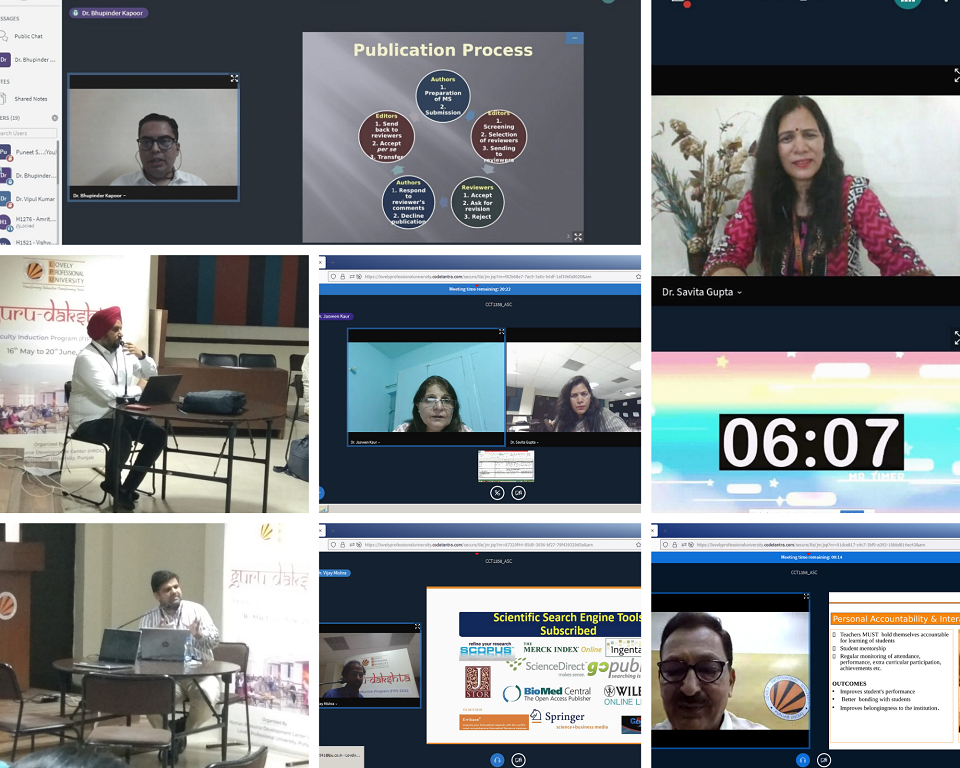
Week 1 and 2 of Guru-Dakshta: Faculty Induction Program (FIP) was designed as per Module I, II and III prescribed as per UGC Guidelines, 2019 in Guru-Dakshta manual. Hence week 1 and 2 targeted M1: Research, Professional Development and Academic Leadership, M2: Higher Education and its Ecosystem and M3: Curriculum design, Outcome based learning and Choice based Credit system
The first module titled “Research, Professional Development and Academic Leadership” provided essential knowledge on the use of acquiring research skills, leadership qualities and facilitating one’s own professional development as well as preparation of a draft manuscript of research paper for high impact publication.
Dr. Sanjay Modi, Pro Vice-Chancellor, Lovely Professional University highlighted leadership that includes roles as creating vision and mission based on science and research data, setting up creative ideas, doing and providing teamwork which will enable a researcher to fulfill their potential in their current and future roles and help them work towards their career goals.
Dr. Jasveen Kaur, Senior Faculty and Former Chairperson-Head, University Business School-UBS, Guru Nanak Dev University, Amritsar oriented the participants on preparation of title and abstract of manuscript and gave hands on experience for preparation of draft of an Extended Abstract.
Dr. Vishal Sarin, Professor, Mittal School of Business, Lovely Professional University deliberated on the use of effective research methodology for the research paper writing as well as texting the apt and pertinent way of writing discussion and conclusion. He also elaborated on the exact way of Graphical Abstract presentation and proper way of image representation for the paper writing and publication in the high impact journals.
Dr. Bhupinder Kapoor, Professor, Department of Pharmaceutical Sciences, Lovely Professional University gave hands on experience on journal peer review process handling referee report and tips & tricks for manuscript editing.
Dr. Manish Vyas, Associate Professor & Asst. Dean, Division of Research and Development, Lovely Professional University focused on:
- Reproduction of data from other journals
- Compilation of discussion and future directions in a review article
- Inter- and intra-departmental collaborations
Dr. Vijay Mishra, Professor, Department of Pharmaceutical Sciences, Lovely Professional University gave hands on experience on Bibliometric Analysis
Dr. Sunaina Ahuja, Professor and Dean-HRDC, Lovely Professional University and Dr. Savita Gupta, Professor and Head Deptt. of Faculty Development, HRDC, Lovely Professional University oriented the participants on Research Ethics and Integrity such as how to avoid plagiarism and publication in predatory journals.
Dr. Ramandeep Singh, Associate Professor & Dy. Dean, Division of Research and Development, Lovely Professional University explored the varied accessible funding schemes for research and development to be availed.
Dr. Suman Maji, Associate Professor, School of Chemical Engineering and Physical Sciences, Lovely Professional University gave hands on experience on Software for reference writing and Bibliography: Mendeley, Zotero, and EndNote.
Dr. Runjhun Tandon, Associate Professor & Deputy. Dean, Division of Research and Development, Lovely Professional University focused on introduction of patents and their uses for research scholars and students and management of intellectual property rights for academicians.
Dr. Namrata Sandhu, Eminent Researcher and International Consultant oriented the participants on how to write an effective literature review and identification of research gaps supported by multiple publications published in high impact journals.
In the second module titled “Higher Education and its Ecosystem” Dr. Sanjay Modi, Pro Vice-Chancellor , Lovely Professional University deliberated on Role of a Teacher: A Pillar of Nation Building and Educational Policies.
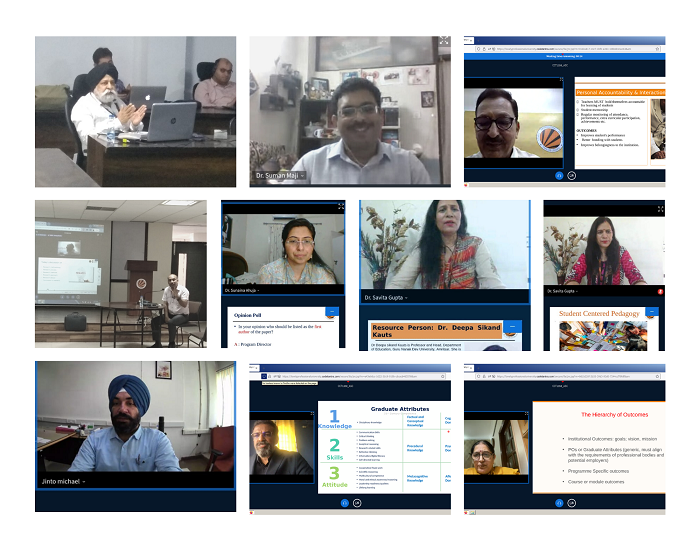
Dr. Sunaina Ahuja, Professor and Associate Dean, Head-HRDC, Lovely Professional University and Dr. Harminder Singh, Professor & Assistant Dean, Department of Accreditation and Rankings, Lovely Professional University focussed on Measuring Teacher Performance as per NAAC Criteria. The experts elaborated on Vision, Mission and Core Values of NAAC, Accreditation Process and Methodologies. SMEs apprise the participants on Quality Indicator Framework (QIF) and Benefits of NAAC Accreditation.
Dr. Ankur Bahl, Associate Professor & Associate Dean, School of Mechanical Engineering Lovely Professional University gave hands on exercise on crafting your Role Profile
The third module titled “Curriculum Designing, Outcome Based Learning and Choice based Credit System” provided essential knowledge and skills to be an active contributor to curriculum designing, outcome based learning techniques and choice-based credit systems.
Dr. Kavita Sharma, Professor, Department of Commerce, University of Delhi oriented the participants on Choice Based Credit System (CBCS). The participants observed that CBCS is the need of the hour for matching Indian Higher Education with Global standards. She also made the participants understand curriculum designing, outcome based learning and Revision in Curriculum: Action on Feedback from Stakeholders. Methods of soliciting feedback from Industry, Academic Fraternity, Students and their Parents and NGOs were discussed. Feedback Analysis and Action Taken Reports were demonstrated.
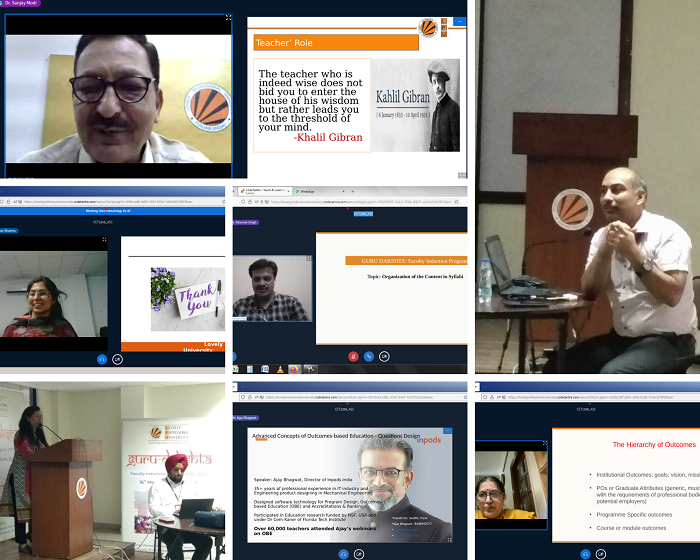
Dr. R. Khanna, Professor, Thapar Institute of Engineering and Technology, Patiala exchanged his views and experiences on Design of Course.
Dr. Navneet Singh, Associate Professor, Division of Academic Affairs, LPU focused on Organization of the Content: Guiding principles in the selection and organization of the content; Structure of subject matter content and Learning Outcomes for the cognitive-affective and psychomotor domains. Dr. Deepa Sikand Kauts, Professor, Guru Nanak Dev University, Amritsar focused on best practices in curriculum design.
Mr. Ajay Bhagwat, CEO, Inpods- Ed-tech expert of technologies for Program Design deliberated on design of Program Educational Objectives and Program Outcomes. Mapping of Program Objectives with Course Learning Outcomes. He elaborated on the structuring the curricula as per program educational objectives derived from University Vision and Mission and Mapping of Program Objectives with Course Learning Outcomes
Dr. Sanjay Modi, Pro Vice-Chancellor, Lovely Professional University, deliberated on the Blooms Taxonomy and explained with examples how teachers can take the learners across the levels of Blooms Taxonomy i.e. Remembering, Understanding, Applying, Analyzing, Evaluating and Creating.
Dr. Balwinder Singh Dhaliwal, Associate Professor, ECE Department, NITTTR, Chandigarh oriented the participants on student evaluation using outcome based learning. He discussed the Steps in Assessment and the complete process of implementation of Outcome Based Learning by sharing case studies from his vast experience in teaching and research. He also gave hands on experience to the participants on CO-PO Attainment Computation and Outcomes Analysis.
Reading material relevant to assessment and evaluation was shared in advance as part of the self-learning process. SMEs used Collaborative-learning methods like discussion, quiz, demonstration, case based teaching and storytelling. Assignment on preparation of an extended Abstract was allotted. Week 1 & 2 culminated with a quiz based on Module I, II & III that gave the organizers an opportunity to assess the learning outcome attainment so far. Feedback was solicited from the participants in response to which they appreciated the gesture shown by the Lovely Professional University in terms of choice of Subject Matter Experts, LPU MyClass Platform giving an interactive learning environment, study material and content delivery.


